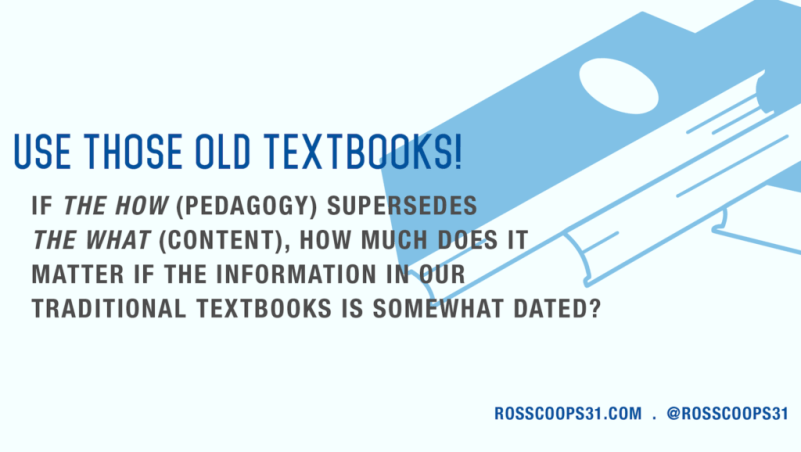Next month I will have the pleasure of working on curriculum mapping with Heidi Hayes Jacobs for two days in New York City!
The Problem
With this opportunity in mind, I decided to rewatch her TED Talk from a few years ago. One of her lines caught my attention:
“Every textbook, in every school, that’s in paper, is dated.”
So, I ask myself, in general…Are we (educators) being a bit melodramatic when we talk about the struggle of having to instruct with outdated textbooks?
The Solution (What)
In talking about curriculum, Dylan Wiliam states:
A bad curriculum well taught is invariably a better experience for students than a good curriculum badly taught: pedagogy trumps curriculum. Or more precisely, pedagogy is curriculum, because what matters is how things are taught, rather than what is taught.
So…If THE HOW (pedagogy) supersedes THE WHAT (content), how much does it matter if the information in our traditional textbooks is somewhat dated?
As a classroom teacher, across all major subject areas, my methodology mimicked the beliefs of Wiliam. This is not to say what I taught was insignificant, but I was most interested in whether my students became problem solvers, collaborators, and critical thinkers. One of the primary ways in which I “measured” their progress was by the confidence and resilience with which they tackled projects at the beginning of the year vs. the end of the year.
Also, many Language Arts and math textbooks have not substantially evolved within recent memory. In my previous district, we were “forced” to update our math books due to discontinued publishing, and the new series looked very much like the old. Science and social studies are a bit different (and these are the two subjects that Jacobs highlights as outdated), but couldn’t we harness these “old” materials as teachable moments in order to demonstrate how things have developed?
The Solution (How)
Finally, Jacobs also addresses a problem with the how, when she announces, “Skills [in textbooks] get dated where we’re using old time skills instead of modernizing them.”…But, does this mean that we need a change in textbooks?
In a previous blog post I addressed this issue as it relates to the Common Core:
With the Common Core State Standards staring everyone in the face, many districts are left scrambling to either (1) purchase “Common Core certified” materials or (2) adapt their old materials for the Common Core. In general, I prefer the latter. Simply purchasing a new series could most likely lead to teachers “doing the same thing” but with new materials, treating the series as if it is the curriculum when it is just a tool or resource…By starting with the “old” series and working from there, Common Core professional development can meet participants within their comfort zones. As a result, successful change is more likely to occur. At the same time, the Common Core will not be seen as just another series that needs to be taught, but as a new set of practice and content standards that should be implemented with help from available tools and resources.
In the End
Overall, the point is not whether I (or anyone else) agrees or disagrees with what Heidi Hayes Jacobs has to say, but that we are thinking critically about the significance (or insignificance) of “outdated” textbooks. On several occasions, I know that districts have had the belief that everything would work itself out if they could just get a new series. In the end, in my opinion, although the newest and shiniest series can certainly help, often times we throw down cash in hopes of avoiding the hard work of shifting culture, attitudes, and instruction.
What are your thoughts on “outdated” textbooks? Do we need to do a better job of keeping our content current, or is the how that much more important? What really matters?
Connect with Ross on Twitter.
- Project Based Learning: 3 Types of Direct Instruction #RealPBL - April 17, 2022
- Getting Started with Project Based Learning #RealPBL - April 11, 2022
- How Do I Lead Project Based Learning? – Evaluate Professional Learning #RealPBL (part 4 of 4) - April 3, 2022

The issue I see is not that the texts are outdated, but that there are textbooks at all. It is extremely counterproductive to teach a student that everything they need to know about a particular subject resides in one book. I recognize your point, that strong petagogy would elicit the introduction of additional resources, but removing this crutch forces creative solutions.
Thanks, Erin! When it comes to textbooks, there are definitely pros and cons, which gives me an idea for another post…
I think that we need to continue to emphasize to teachers that textbooks or text materials are resources. If we use this approach with viable and reliable pedagogy, then the date of the material should not matter.
Thanks, Theresa! I agree. Often times, the textbook is seen as the curriculum, when it is anything but.
Thank you for sharing this powerful piece Ross!
Sorry- hit publish too soon! What I wanted to say was that it is rarely about the stuff we use – whether it is an old outdated textbook or a newly created YouTube video, that stuff won’t dictate how much our children learn. Instead, what will impact how much our children learn are the teachers leading and facilitating the learning – it is all about instructional practices and techniques. Of course, the success of any classroom is rooted in relationships – healthy relationships between all learners (adult and children) that are rooted in trust and respect!
Thanks, Tony! I believe you hit the nail right on the head. It’s all about relationships and effective pedagogy, not materials.